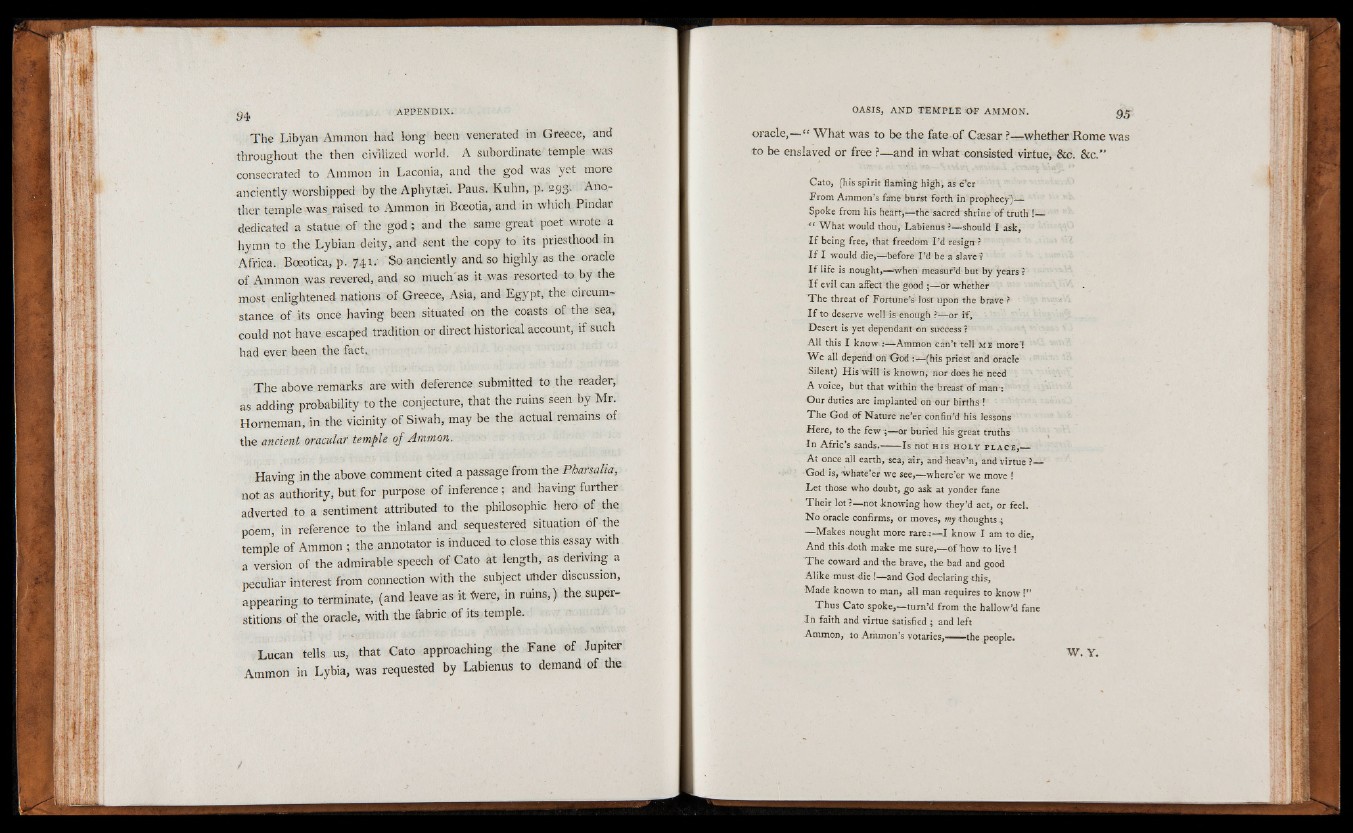
The Libyan Ammon had long been venerated in Greece, and
throughout the then civilized world. A subordinate temple was
consecrated to Ammon in Laconia, and the god was yet more
anciently worshipped by the Aphytæi. Paus. Kuhn, p. 2.98- Another
temple -was. raised to Ammon in Boeotia, and in which Pindar
dedicated a statue of the god ; and the same great poet wrote a
hymn to the Lybian deity, and sent the copy to its priesthood in
Africa. Boeotica, p. 741: So anciently and so highly as the oracle
of Ammon was revered, and so much'as it was resorted to by the
most enlightened nations of Greece, Asia, and Egypt, the circumstance
of its once having been situated on the coasts of the sea,
could not have escaped tradition or direct historical account, if such
had ever been the fact.
The above remarks are with deference submitted to the reader,
as adding probability to the conjecture, that the ruins seen by Mr.
Horneman, in the vicinity of Siwah, may be the actual remains of
the ancient oracular temple of Ammon,
Having in the above comment cited a passage from the Pharsalia,
not as authority, but for purpose of inference ; and having further
adverted to a sentiment attributed to the philosophic hero of the
poem, in reference to the inland and sequestered situation of the
temple of Ammon ; the annotator is induced to close this essay with
a version of the admirable speech of Cato at length, as deriving a
peculiar interest from connection with the subject under discussion,
appearing to terminate, (and leave as it fvere, in ruins,) the superstitions
of the oracle, with the fabric ot its temple.
Lucan tells us, that Cato approaching the Fane of Jupiter
Ammon in Lybia, was requested by Labienus to demand of the
oracle,— “ What was to be the fate of Caesar ?— whether Rome was
to be enslaved or free ?— and in what consisted virtue, See. Sec."
Cato, (his spirit flaming high, as e’er
Prom Ammon’s fane burst forth in prophecy)—
Spoke from his heart,— the sacred shrine o f truth!—
What would thou, Labienus ?— should I ask.,
I f being free, that freedom I ’d resigrr?
I f I would die,—before I ’d be a slaved
I f life is nought,—'When measur’d but by years ?
I f evil can affect the good ;— or whether -
T h e threat o f Fortune’s lost’ upon the brave ?
I f to deserve well is enough ?— or if,
Desert is yet dependant on success ?
All this I know :— Ammon can’t tell me morel
W e all depend on God :—{his priest and oracle
Silent) His will is known,- nor does he need
A voice, but that within the breast o f man:
Our duties are implanted on our births !
T h e God of Nature ne’er confin’d his lessons
Here, to the few ;— or buried his great truths
In Afr ic’s sands. Is not h i s h o l y p l a c e ,_
At once all earth, sea, air, and heav’n, and virtue ?_
•God is, whate’er we see,— where’er we move 1
Le t those who doubt, go ask at yonder fane
Their lot ?—-not knowing Low they’d act, or feeL
N o oracle confirms, or moves, my thoughts 4
— Makes nought more rare.:— I know I am to die,
And this-doth make me sure,— of how to live !
'The coward and the brave, the bad and good
Alike must'die 1— and God declaring •this,
Made known to man, all man requires to know P*
Thus Cato spoke,— turn’d from the hallow’d fane
In faith and virtue satisfied ; and left
Ammon, to Ammon’s votaries,— the people.
W . Y ,